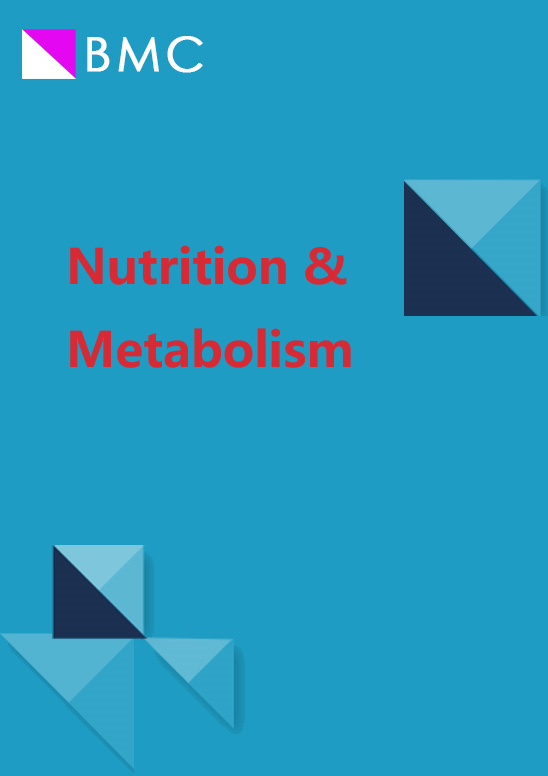组织特异性胰岛素抵抗和对为期 12 周的等热量膳食宏量营养素干预反应的身体成分和体脂分布
IF 3.9
2区 医学
Q2 NUTRITION & DIETETICS
引用次数: 0
摘要
身体成分和体脂分布是预测心脏代谢疾病的重要指标。心脏代谢疾病的病因是多方面的,部分原因是个体间组织特异性胰岛素敏感性的差异。目的是研究:(1)身体成分与全身、肝脏和肌肉胰岛素敏感性之间的关系;(2)经过 12 周高单不饱和脂肪酸(HMUFA)或低脂肪、高蛋白、高纤维(LFHP)等热量饮食后,身体成分和胰岛素敏感性的变化及其关系。这项 PERSON 研究的子队列分析包括 93 名参加随机干预研究的人(53% 为女性,体重指数 25-40 kg/m2,40-75 岁)。在基线期和采用 LFHP 或 HMUFA 饮食 12 周后,我们进行了 7 点口服葡萄糖耐量测试,以评估全身、肝脏和肌肉的胰岛素敏感性,并进行了全身磁共振成像,以确定身体成分和体脂分布。两种饮食都符合健康营养指南的要求。基线时,肝脏脂肪含量与肝脏胰岛素敏感性较差有关(β [95%CI]; 0.12 [0.01; 0.22])。只有女性的大腿肌肉脂肪含量与肌肉胰岛素敏感性成反比(-0.27 [-0.48; -0.05])。内脏脂肪组织(VAT)与全身、肝脏和肌肉的胰岛素敏感性成反比。两种饮食都能降低内脏脂肪组织、腹部皮下脂肪组织(aSAT)和肝脏脂肪,但不能降低全身和特定组织的胰岛素敏感性,且饮食之间没有差异。然而,与 HMUFA 膳食相比,LFHP 膳食后腰围的减少幅度更大(分别为-3.0 厘米和-0.5 厘米)。摄入 LFHP 而非 HMUFA 膳食后,身体成分的改善与全身和肝脏胰岛素敏感性的改善呈正相关。肝脏和肌肉的胰岛素敏感性与肝脏和肌肉的脂肪积累明显相关。虽然 LFHP 和 HMUFA 饮食都能改善体脂、VAT、aSAT 和肝脏脂肪,但只有 LFHP 引起的身体成分改善与胰岛素敏感性改善相关。NCT03708419(clinicaltrials.gov)。本文章由计算机程序翻译,如有差异,请以英文原文为准。
Body composition and body fat distribution in tissue-specific insulin resistance and in response to a 12-week isocaloric dietary macronutrient intervention
Body composition and body fat distribution are important predictors of cardiometabolic diseases. The etiology of cardiometabolic diseases is heterogenous, and partly driven by inter-individual differences in tissue-specific insulin sensitivity. To investigate (1) the associations between body composition and whole-body, liver and muscle insulin sensitivity, and (2) changes in body composition and insulin sensitivity and their relationship after a 12-week isocaloric diet high in mono-unsaturated fatty acids (HMUFA) or a low-fat, high-protein, high-fiber (LFHP) diet. This subcohort analysis of the PERSON study includes 93 individuals (53% women, BMI 25–40 kg/m2, 40–75 years) who participated in this randomized intervention study. At baseline and after 12 weeks of following the LFHP, or HMUFA diet, we performed a 7-point oral glucose tolerance test to assess whole-body, liver, and muscle insulin sensitivity, and whole-body magnetic resonance imaging to determine body composition and body fat distribution. Both diets are within the guidelines of healthy nutrition. At baseline, liver fat content was associated with worse liver insulin sensitivity (β [95%CI]; 0.12 [0.01; 0.22]). Only in women, thigh muscle fat content was inversely related to muscle insulin sensitivity (-0.27 [-0.48; -0.05]). Visceral adipose tissue (VAT) was inversely associated with whole-body, liver, and muscle insulin sensitivity. Both diets decreased VAT, abdominal subcutaneous adipose tissue (aSAT), and liver fat, but not whole-body and tissue-specific insulin sensitivity with no differences between diets. Waist circumference, however, decreased more following the LFHP diet as compared to the HMUFA diet (-3.0 vs. -0.5 cm, respectively). After the LFHP but not HMUFA diet, improvements in body composition were positively associated with improvements in whole-body and liver insulin sensitivity. Liver and muscle insulin sensitivity are distinctly associated with liver and muscle fat accumulation. Although both LFHP and HMUFA diets improved in body fat, VAT, aSAT, and liver fat, only LFHP-induced improvements in body composition are associated with improved insulin sensitivity. NCT03708419 (clinicaltrials.gov).
求助全文
通过发布文献求助,成功后即可免费获取论文全文。
去求助
来源期刊

Nutrition & Metabolism
医学-营养学
CiteScore
8.40
自引率
0.00%
发文量
78
审稿时长
4-8 weeks
期刊介绍:
Nutrition & Metabolism publishes studies with a clear focus on nutrition and metabolism with applications ranging from nutrition needs, exercise physiology, clinical and population studies, as well as the underlying mechanisms in these aspects.
The areas of interest for Nutrition & Metabolism encompass studies in molecular nutrition in the context of obesity, diabetes, lipedemias, metabolic syndrome and exercise physiology. Manuscripts related to molecular, cellular and human metabolism, nutrient sensing and nutrient–gene interactions are also in interest, as are submissions that have employed new and innovative strategies like metabolomics/lipidomics or other omic-based biomarkers to predict nutritional status and metabolic diseases.
Key areas we wish to encourage submissions from include:
-how diet and specific nutrients interact with genes, proteins or metabolites to influence metabolic phenotypes and disease outcomes;
-the role of epigenetic factors and the microbiome in the pathogenesis of metabolic diseases and their influence on metabolic responses to diet and food components;
-how diet and other environmental factors affect epigenetics and microbiota; the extent to which genetic and nongenetic factors modify personal metabolic responses to diet and food compositions and the mechanisms involved;
-how specific biologic networks and nutrient sensing mechanisms attribute to metabolic variability.
 求助内容:
求助内容: 应助结果提醒方式:
应助结果提醒方式:


